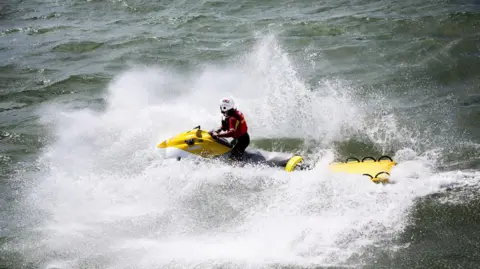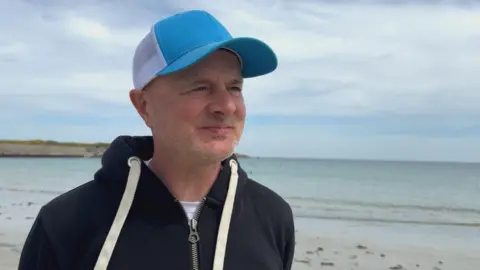Lifesavers urge beachgoers to stay safe in the sea
 RNLI/Nathan Williams
RNLI/Nathan WilliamsWater safety experts across the south west of England and the Channel Islands are advising swimmers and surfers to be safe in the water this May bank holiday weekend.
The Surf Life Saving GB (SLSGB) said its volunteers had already had a busy start to the season and had carried out 219 lifesaving interventions this year.
The RNLI said its lifeguards would start patrolling 26 beaches across the South West - which includes beaches in Jersey, Devon and Cornwall - from Saturday in anticipation of more visitors to the coast in the forecasted sunny weather.
Alan Jenner, outdoor and adventure sports development officer for Guernsey Sports Commission, said the major area of concern in Guernsey was "stranding".
The warning comes after busy week for crews after a 14-year-old surf lifesaver saved a paddleboarder's life in north Devon after he had been temporarily paralysed by a blow to the head.
In a post on Instagram, Newquay Coastguard said it was called to Fistral Beach, along with other emergency services, on Tuesday following an incident.
On Wednesday a father and his eight-year-old son were rescued by lifesavers at Holywell Bay, near Newquay, in Cornwall.
Staying safe
Adrian Mayhew, national operations and safety manager for SLSGB said the charity had seen an increase in non-fatal drowning incidents in Devon and Cornwall.
He said in 2023 Devon had 12 accidental drownings and Cornwall had four, which he said puts the counties into the "upper regions of water hotspots".
However, the problem is larger than that due to the number of incidents that were prevented by the charity's lifesavers, he added.
He said: "In 2024 SLSGB prevention work on beaches resulted in over 3,000 incidents recorded alone."
Mr Mayhew attributed the increase in the number of incidents to the increased popularity of open water swimming, non-powered craft and parents not keeping an eye on their children.
He said some swimmers had a "poor understanding of the risks in cold water, tides, wind direction and how to stay safe".
He said: "Outdoor adventure has becoming exciting, anyone can buy a kayak, cheap lifejacket or stand up paddleboard and not get the right training to be safe."
'Respect the water'
Mr Mayhew advised open water swimmers to remember, if they are not used to the water temperature, the cold water could trigger a shock response.
He said: "It will take your breath away and for a couple of minutes may make swimming hard.
"So, take your time going in and once in, where you can stand up.
"Let the body get use to the experience of the water before deciding to swim."
He also advised people to join their local life saving club to learn how to make a difference to people in trouble.
Mr Mayhew advised paddleboarders to check their kit before entering the water, check their personal floatation device is working and that they have a pea-less whistle.
He said: "We want to enjoy the water, of course, but we must learn to respect the water so we can come back and play tomorrow."
'Float to live'
To stay safe, the RNLI urged the public to choose a lifeguarded beach where possible and swim between the red and yellow flags.
Gareth Morrison, head of water safety for the RNLI, said: "If you get into trouble in the water, float to live by tilting your head back with ears submerged and try to relax and control your breathing.
"Use your hands to help you stay afloat and then call for help or swim to safety if you can.
"It's OK if your legs sink, we all float differently."
Both charities reminded people to call 999 and ask for the coastguard if they saw someone in trouble.

Alan Jenner, outdoor and adventure sports development officer for Guernsey Sports Commission, said understanding tides and encouraging swimmers to wear tow floats was a target for the island.
"Every single year we have strandings around the island," he said.
"Also people going out on offshore winds, an offshore wind is a wind that pushes you out to sea from the beach.
"The lifeboat has been called out 300% more than it used to because people are going out on floatable unicorns and lilos and paddleboards and kayaks, being pushed out to sea and they can't get back to land."
Follow BBC Cornwall on X, Facebook and Instagram. Follow BBC Devon on X, Facebook and Instagram. Send your story ideas to [email protected]. Follow BBC Guernsey on X and Facebook. Follow BBC Jersey on X and Facebook. Send your story ideas to [email protected].
